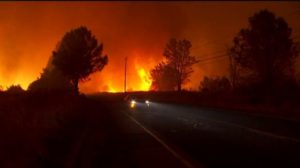The Federal Emergency Management Agency (FEMA) has sunk to a new low—allegedly abducting traumatized Californians from portable restrooms the agency had strategically placed around northern California counties in the aftermath of PG&E’s unprecedented power disruption.
Early last week, PG&E announced it would temporarily cut power to nearly 800,000 residents. A PG&E spokesperson had said especially dangerous high winds—which never materialized—might damage or destroy the company’s fossilized transmission lines and create a repeat of last year’s killer wildfires, which left nearly 2 million acres scorched and 100 dead, the worst toll in the state’s history. This year, PG&E said it took precautions to prevent a repeat performance.
Part of those precautions included the creation of “community resource centers,” which are basically parking lots equipped with bottled water, air-conditioned tents, charging stations, and soiled porta potties for people desperate to relieve themselves. Relief stations sprouted up in West Marin County near Muir Woods and Mount Tamalpais, the dry hills of Lake County, and wine-country counties like Napa and Sonoma—the first areas to lose power.
While PG&E built the makeshift stalls, its employees did not staff them. That responsibility fell to local authorities, civilian aid agencies, and, in at least one instance, agents of FEMA. One such relief station was located at 7351 Tompkins Hill Rd, Eureka, one of the first cities to lose power. Nearby residents flocked to it to charge their phones or use one of the fifty portable bathrooms in the College of the Redwoods parking lot.
fell to local authorities, civilian aid agencies, and, in at least one instance, agents of FEMA. One such relief station was located at 7351 Tompkins Hill Rd, Eureka, one of the first cities to lose power. Nearby residents flocked to it to charge their phones or use one of the fifty portable bathrooms in the College of the Redwoods parking lot.
Edward Hidalgo, 53, who lives a quarter-mile away, said his wife Gloria mysteriously vanished from the aid station, and that he believes FEMA is responsible or at least concealing knowledge of her disappearance. At approximately 9:30pm Friday, she walked the short distance to the relief center to charge her cellular phone and use the restroom, while he stayed home to repel any would-be looters that might have been casing their residence. Mr. Hidalgo said his wife was an avid walker who often took evening strolls through the upscale neighborhood. When she had not returned at 10:30, Mr. Hidalgo tried without success to reach her cell phone and then drove to the emergency station hoping to find her.
What he saw chilled his bones; three armed FEMA agents approached his vehicle, insisted  he identify himself, and demanded to know his business.
he identify himself, and demanded to know his business.
“I told them I was looking for my wife, that she had gone there. Without a moment’s hesitation, a FEMA guy told me ‘your wife isn’t here’ and told me I had to leave unless I was using the bathroom or a charging station. They said I couldn’t loiter. And wouldn’t let me look around the parking lot for my wife. I felt my life was in danger,” Mr. Hidalgo said.
Undaunted, he parked his car beyond the fence that encircled the parking lot and staked out the area for any sign of his wife. He waited and waited, but she never showed. However, Mr. Hidalgo said he witnessed an event that rattled his nerves.
“I had a clear view of the parking lot from where I was parked. The place was awash in  flood lamps powered by portable generators. The FEMA people hung ‘out of order’ signs on all but three of the restrooms. I saw a woman I did not recognize enter one of them—and she never came out. I know this because ten minutes later another person entered the same stall—and it was empty. It was as if it swallowed up the woman who had been using it. I spent the rest of the night driving around, looking for Gloria,” Mr. Hidalgo said.
flood lamps powered by portable generators. The FEMA people hung ‘out of order’ signs on all but three of the restrooms. I saw a woman I did not recognize enter one of them—and she never came out. I know this because ten minutes later another person entered the same stall—and it was empty. It was as if it swallowed up the woman who had been using it. I spent the rest of the night driving around, looking for Gloria,” Mr. Hidalgo said.
The next morning, after daybreak, he returned to the scene of the crime to discover that half the restrooms had been removed and that Red Cross volunteers had replaced the FEMA agents that guarded the parking lot the previous night. He asked a Red Cross employee why FEMA had been tasked with guarding a community assistance station and was told “FEMA was never here. Who told you FEMA was here?”
That day, Mr. Hidalgo filed a missing person report with the Humboldt County Sherriff’s Office. A sheriff’s deputy, he said, greeted him with apathy and hostility.
“They were more interested in microscopically looking to see if I had a criminal history than  they were hearing about my missing wife. They took the report, but only after asking me if I am a firearms owner and how many guns are in my household. Something very fishy is going on, and I believe FEMA knows what happened to my wife and that other woman I saw enter the restroom,” Mr. Hidalgo said.
they were hearing about my missing wife. They took the report, but only after asking me if I am a firearms owner and how many guns are in my household. Something very fishy is going on, and I believe FEMA knows what happened to my wife and that other woman I saw enter the restroom,” Mr. Hidalgo said.










This article is BS. I live not far from Eureka and there is NO charging station on Tompkins Hill Road. The article reads like a fiction story, good writing, but it’ all B.S.
So Agenda 21 has begun. Never ever go to a FEMA camp, for any reason.